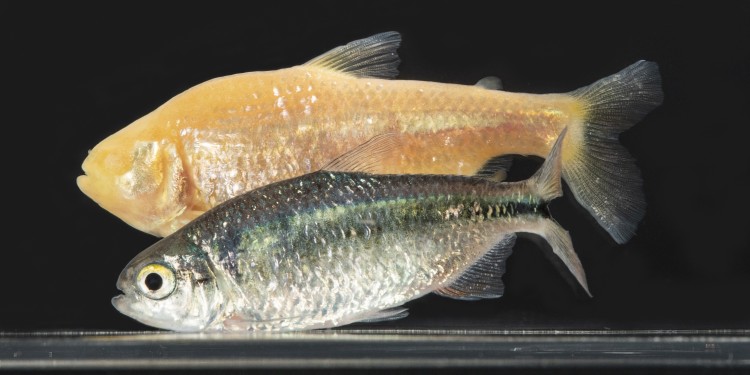
Cavefish have fewer cells of the innate immune system
Cavefish are small, live in tucked away places humans rarely go, and they’re common enough that you can find them on every continent except Antarctica. But they also have another characteristic that seems surprising at first glance: They can tell researchers something about the occurrence of autoimmune diseases in humans. Because similar to people, cavefish live in an environment with a reduced number of parasites. Unlike people, however, cavefish have had much more time – about 150,000 years – to adapt to these conditions. To learn more about how a low-parasite environment may shape the evolution of a host’s immune system, an international team of researchers led by the Stowers Institute for Medical Research examined the impact of decreased parasite abundance and infection on the evolution of the cavefish immune system.
The scientists under participation of Dr. Jörn P. Scharsack from the Univerity of Münster characterized the cavefish immune system and how it responds to threats, compared to that of closely-related river fish from a parasite-rich environment. Their findings show that cavefish differ in their sensitivity toward immune stimulants and have a different composition of immune cells, including a reduction of cells of the innate immune system that play a role in inflammation.
In future studies, the scientists hope to identify genetic factors involved in cavefish immune system evolution. This research could provide clues about the development of immune system disorders and potentially human autoimmune diseases, where the immune system attacks its own body. The study has been published in the journal “Nature Ecology & Evolution”.
Background and methods:
Like humans, cavefish have an innate and an adaptive immune system that protect them from potential parasites. But unlike cavefish, the human immune system sometimes looks for something to attack even when parasites aren’t there, while the cavefish have evolved an immune system that seems to act normally even in the absence of parasites.
“One hypothesis is that certain parasites help to balance our immune system responses. In the absence of these parasites, this balance can be disturbed and as a consequence the immune system attacks our own cells in the body,” says first author Dr. Robert Peuß, who conducted the study in the research group of Dr. Nicolas Rohner at the Stowers Institute and is now working at Münster University. The question of why one person’s immune system is affected while another is not is still a question that puzzles many scientists around the world.
Advances in modern hygiene and medical treatments have improved health and increased life expectancy, but it’s a relatively new situation for us, so evolutionary processes haven’t had time to provide a way to deal with it. But cavefish have been in these parasite-free caves for more than a hundred thousand years, which is a much longer time for evolution to come into play.
In their study, the researchers evaluated the environments of the Pachón cavefish and the closely-related Río Choy river (or surface) fish in Mexico. “We found an incredible number of parasites in surface fish – in the gut, skin, liver, gall bladder – everywhere. But we didn’t find any parasites in the cavefish,” says Peuss. “It’s not too surprising because caves are a biodiversity-deprived environment. There are very few animals there, so there’s less of a chance for parasites to find the hosts they need to survive.”
Then, in the lab, the researchers looked at the innate and adaptive immune system of both types of fish. The innate immune system is the first line of defense against parasites and triggers an unspecific inflammatory response as a broad defense strategy, while the adaptive immune system is usually slower in mounting an immune response but this response is highly specifc. The first observation the team made was that, compared to surface fish, the cavefish innate immune system is much more sensitive when confronted with a potential threat, resulting in a stronger inflammatory response.
Interestingly, the team found that cavefish produce fewer cells that make up the innate immune system. This reduction in innate immune cells could potentially compensate for the increased sensitivity. But is the decreased number of innate immune cells in cavefish purely a consequence of fewer parasites in the cave, or are there other benefits from producing fewer of these cells that drive inflammation?
To answer this question, the researchers looked at the body fat levels of the cavefish. Increased fatty tissue would normally increase inflammation as well – it’s true in humans. But when the researchers examined the cavefish, that wasn’t the case. Cavefish, which have much higher body fat levels than surface fish, did not show higher levels of inflammation.
“The reduction of innate immune cells in cavefish compared to surface fish is probably the cause for the lack of the inflammatory response,” Robert Peuß says.
The genetic factors that lead to the reduced production of innate immune cells in cavefish are still unknown. The next step in this research is to try to identify those factors, and see if there might be similar factors in humans.
Development of cavefish breeding at the Institute for Evolution and Biodiversity at Münster University
With Robert Peuß' move to the Institute of Evolution and Biodiversity at Münster University, the scientists plan to establish cavefish breeding there and to establish the animals as a research model for host-parasite interactions. The research focus will be on studies to explore the genetic basis for immune investment strategies and immunological hypersensitivity.
Participating institutions and funding:
In addition to the Stowers Institute for Medical Research in Kansas City and the University of Münster, the Universidad Nacional Autónoma de México was involved in the study. The study received financial support from the Stowers Institute for Medical Research and from the German Research Foundation.
Original publication:
R. Peuß et al. (2020): Adaptation to low parasite abundance affects immune investment and immunopathological responses of cavefish. Nature Ecology & Evolution; DOI: 10.1038/s41559-020-1234-2
